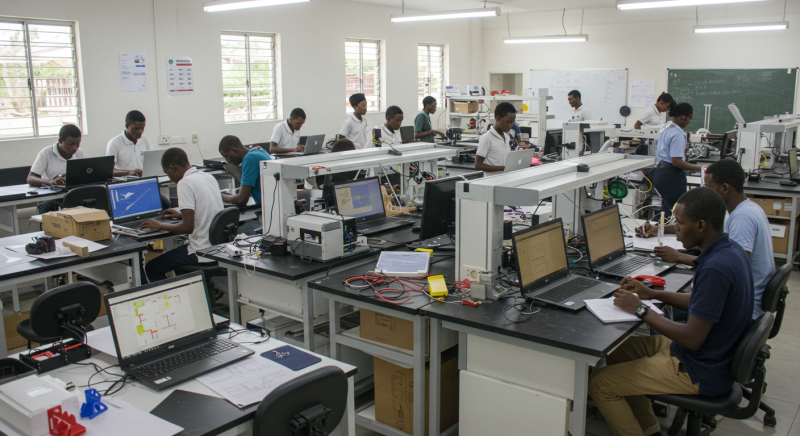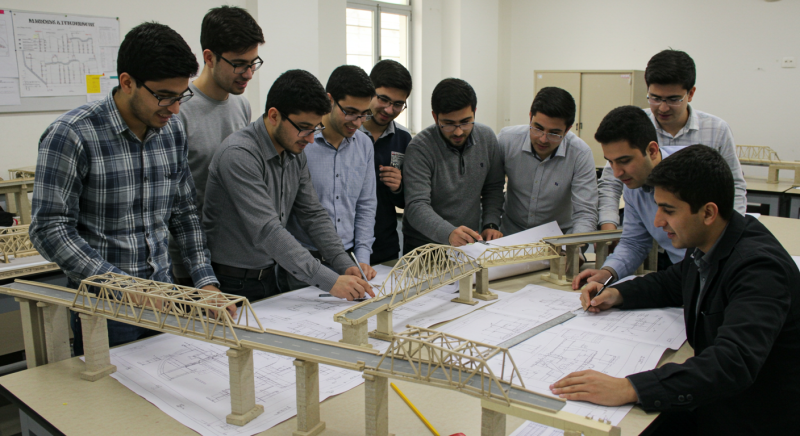The dreams of young Africans pursuing engineering excellence have never been brighter, yet the journey to finding the right university can feel overwhelming. With over 1,000 institutions across the continent claiming excellence, how do you identify which ones truly deliver world-class engineering education? As Africa’s tech revolution accelerates and infrastructure demands soar, choosing the best engineering universities in Africa 2025 ranking becomes crucial for your future success. This comprehensive guide will walk you through everything you need to know about Africa’s top engineering institutions, helping you make an informed decision that could shape your entire career.
Key Takeaways
Understanding the landscape of Africa’s premier engineering institutions requires examining several critical factors that distinguish exceptional universities from average ones.
The best engineering universities in Africa 2025 ranking considers research output, international recognition, industry partnerships, graduate employment rates, and alumni achievements. These universities offer diverse engineering specializations including civil, mechanical, electrical, computer science, and emerging fields like renewable energy engineering.
Tuition fees vary significantly across institutions and countries, ranging from highly affordable public universities to premium private institutions.
Alumni success stories from these top-ranked universities demonstrate their ability to produce industry leaders, entrepreneurs, and innovators who drive Africa’s technological advancement.
The selection process should consider your specific engineering interests, financial capacity, preferred location, and long-term career aspirations.

Understanding Africa’s Engineering Education Landscape
Africa’s engineering education sector has experienced remarkable transformation over the past decade, with universities investing heavily in modern facilities, international partnerships, and cutting-edge research programs. The continent now hosts world-class institutions that compete globally while addressing unique African challenges in infrastructure, energy, and technology.
The best engineering universities in Africa 2025 ranking reflects this evolution, showcasing institutions that have embraced innovation, maintained rigorous academic standards, and produced graduates who excel in both local and international markets. These universities have developed strong industry connections, established research centers of excellence, and created programs that blend theoretical knowledge with practical application.
Top 10 Best Engineering Universities in Africa 2025 Ranking
1. University of Cape Town (South Africa)
The University of Cape Town consistently ranks as the premier engineering institution in Africa, with its Faculty of Engineering & the Built Environment leading continental innovation. UCT’s engineering programs combine rigorous academic training with cutting-edge research in areas like renewable energy, sustainable infrastructure, and biomedical engineering.
Programs Offered: Civil, Mechanical, Electrical, Chemical, Computer Science, and Biomedical Engineering
Annual Tuition Fees:
- Local students: R62,000 – R89,000 ($3,400 – $4,900)
- International students: R125,000 – R178,000 ($6,900 – $9,800)
Notable Alumni Success: Dr. Mark Shuttleworth (first African in space and Ubuntu founder) and numerous executives leading major African infrastructure projects demonstrate UCT’s impact on continental development.
2. University of the Witwatersrand (South Africa)
Wits University’s School of Engineering has earned global recognition for mining engineering excellence while expanding into renewable energy, robotics, and artificial intelligence. The institution’s strong industry partnerships provide students with exceptional internship and employment opportunities.
Programs Offered: Mining, Mechanical, Electrical, Industrial, Civil, and Aeronautical Engineering
Annual Tuition Fees:
- Local students: R58,000 – R76,000 ($3,200 – $4,200)
- International students: R115,000 – R152,000 ($6,300 – $8,400)
Alumni Success Story: Many Wits graduates lead major mining corporations across Africa, including Anglo American, De Beers, and numerous renewable energy companies transforming the continent’s power sector.
3. Stellenbosch University (South Africa)
Stellenbosch University’s Faculty of Engineering represents innovation in sustainable engineering solutions, with particular strength in agricultural engineering, wine technology, and renewable energy systems. The university’s bilingual environment and strong research culture attract top talent from across Africa.
Programs Offered: Agricultural, Chemical, Civil, Electrical, Industrial, and Mechanical Engineering
Annual Tuition Fees:
- Local students: R55,000 – R72,000 ($3,000 – $4,000)
- International students: R108,000 – R144,000 ($5,900 – $7,900)
4. Cairo University (Egypt)
Cairo University’s Faculty of Engineering stands among Africa’s most historic and prestigious engineering institutions, producing generations of leaders who have shaped the Middle East and North Africa’s infrastructure development. The university excels in petroleum engineering, structural engineering, and urban planning.
Programs Offered: Civil, Mechanical, Electrical, Petroleum, Computer, and Architectural Engineering
Annual Tuition Fees:
- Local students: EGP 3,000 – 8,000 ($100 – $250)
- International students: $3,000 – $5,000

5. American University in Cairo (Egypt)
AUC’s School of Sciences and Engineering offers internationally accredited programs that bridge American educational standards with regional needs. The university’s strong connections to multinational corporations provide exceptional career opportunities for graduates.
Programs Offered: Computer Science, Construction Engineering, Electronics, Mechanical, and Petroleum Engineering
Annual Tuition Fees: $23,000 – $26,000 for all students
6. University of Nairobi (Kenya)
The University of Nairobi’s College of Engineering stands as East Africa’s premier engineering institution, with particular strength in sustainable development, water resources, and telecommunications engineering. The university’s research focus on appropriate technology addresses pressing African challenges.
Programs Offered: Civil, Mechanical, Electrical, Environmental, and Geospatial Engineering
Annual Tuition Fees:
- Local students: KSh 150,000 – 250,000 ($1,100 – $1,800)
- International students: $4,500 – $6,500
7. Makerere University (Uganda)
Makerere University’s College of Engineering, Design, Art and Technology has earned recognition for producing innovative solutions to African challenges. The institution’s focus on appropriate technology and sustainable development attracts students from across East Africa.
Programs Offered: Civil, Mechanical, Electrical, Agricultural, and Computer Engineering
Annual Tuition Fees:
- Local students: UGX 3,500,000 – 5,500,000 ($950 – $1,500)
- International students: $3,000 – $4,500
8. University of Ghana (Ghana)
The University of Ghana’s College of Engineering represents West Africa’s commitment to engineering excellence, with growing strength in renewable energy, telecommunications, and biomedical engineering. The institution’s industry partnerships facilitate strong graduate employment rates.
Programs Offered: Civil, Mechanical, Electrical, Computer, Food Process, and Biomedical Engineering
Annual Tuition Fees:
- Local students: GHS 8,000 – 12,000 ($1,400 – $2,100)
- International students: $8,000 – $12,000
9. University of Nigeria, Nsukka (Nigeria)
UNN’s Faculty of Engineering has established itself as a leader in engineering education across Nigeria, with particular strength in electronics, computer engineering, and agricultural mechanization. The university’s research output and industry collaborations continue expanding.
Programs Offered: Civil, Mechanical, Electrical/Electronics, Computer, and Agricultural Engineering
Annual Tuition Fees:
- Local students: ₦150,000 – 300,000 ($200 – $400)
- International students: $2,500 – $4,000
10. Mohammed V University (Morocco)
Morocco’s premier technical institution, Mohammed V University’s National School of Applied Sciences, has gained recognition for engineering excellence in North Africa. The university’s multilingual environment and European partnerships create global opportunities for graduates.
Programs Offered: Civil, Mechanical, Electrical, Computer Science, and Industrial Engineering
Annual Tuition Fees:
- Local students: MAD 15,000 – 25,000 ($1,500 – $2,500)
- International students: $4,000 – $6,000
Program Specializations and Emerging Fields
The best engineering universities in Africa 2025 ranking reflects institutions that have adapted their curricula to address both traditional engineering needs and emerging technological demands. These universities offer comprehensive programs in established fields while pioneering new specializations that respond to Africa’s unique challenges and opportunities.
Civil engineering programs across these institutions focus heavily on sustainable infrastructure development, addressing Africa’s massive infrastructure gap while incorporating climate-resilient design principles. Mechanical engineering departments emphasize renewable energy systems, agricultural mechanization, and manufacturing technologies that support local industrialization efforts.
Electrical and computer engineering programs have evolved to address Africa’s digital transformation needs, with specialized tracks in telecommunications, renewable energy systems, and emerging technologies like Internet of Things applications for smart cities and precision agriculture.
Financial Investment and Value Proposition
Understanding the financial commitment required for engineering education at Africa’s top institutions helps families make informed decisions about their educational investment. The best engineering universities in Africa 2025 ranking includes institutions across various price points, ensuring quality education remains accessible to students from different economic backgrounds.
Public universities generally offer the most affordable options, with many providing excellent education at surprisingly low costs. South African institutions, while slightly more expensive, offer world-class facilities and international recognition that justify their higher fees. Private universities like AUC command premium prices but provide unique advantages including smaller class sizes, extensive industry connections, and often superior career services.
The return on investment for graduates from these top-ranked institutions remains exceptional, with engineering graduates typically earning starting salaries that allow for comfortable cost of living across Africa while building successful careers in rapidly growing sectors.
Alumni Success Stories That Inspire
The true measure of any university’s excellence lies in the achievements of its graduates, and the best engineering universities in Africa 2025 ranking features institutions whose alumni have transformed industries, launched successful companies, and led major infrastructure projects across the continent.
University of Cape Town graduates have founded numerous successful technology companies, led major mining operations, and pioneered renewable energy projects across Africa. UCT alumni consistently occupy senior engineering positions in multinational corporations and government agencies throughout the continent.
Wits University alumni have become industry leaders in mining, manufacturing, and emerging technology sectors. Many have established successful consulting firms that provide engineering services across Africa, while others have risen to executive positions in major corporations.
Cairo University graduates have played crucial roles in Egypt’s major infrastructure projects, including the New Administrative Capital and the New Suez Canal expansion. Many have established successful engineering consultancies that serve the broader Middle East and North Africa region.
American University in Cairo alumni often secure positions with international corporations, leveraging their American-style education and regional knowledge to build successful careers in engineering and technology management across multiple continents.
Research Excellence and Innovation Impact
Research output and innovation capacity distinguish the best engineering universities in Africa 2025 ranking from other institutions. These universities have established research centers that address critical African challenges while contributing to global knowledge advancement.
University of Cape Town’s research initiatives in renewable energy have influenced policy development across southern Africa, while their work in biomedical engineering has led to breakthrough medical device innovations suitable for resource-constrained environments.
Stellenbosch University’s research in precision agriculture and sustainable engineering has transformed farming practices across Africa, while their renewable energy research contributes to continental energy security initiatives.
The University of Nairobi’s research in appropriate technology and sustainable development has influenced engineering practice across East Africa, with many innovations being adopted throughout the region.
Industry Partnerships and Career Opportunities
Strong industry connections separate exceptional engineering universities from average institutions, and the best engineering universities in Africa 2025 ranking prioritizes institutions with robust professional networks and career development support.
These top universities maintain partnerships with major corporations, government agencies, and international organizations that provide students with internship opportunities, research collaborations, and employment pathways. Many have established dedicated career services departments that actively connect students with potential employers and provide ongoing professional development support.
The strength of these industry relationships becomes evident in graduate employment rates, with top-ranked institutions consistently achieving over 85% employment rates within six months of graduation, often with starting salaries significantly above national averages.
Admission Requirements and Application Strategies
Gaining admission to institutions featured in the best engineering universities in Africa 2025 ranking requires careful preparation and strategic application approaches. Most require strong performance in mathematics and physics at the secondary school level, along with demonstrated interest in engineering through extracurricular activities or relevant work experience.
International students should begin the application process at least 12 months before their intended start date, allowing sufficient time for credential evaluation, language proficiency testing where required, and visa processing. Many institutions offer foundation programs for students who need additional preparation before beginning their engineering studies.
The application process typically involves submitting academic transcripts, standardized test scores, personal statements, and letters of recommendation. Some universities require interviews or portfolio submissions depending on the specific engineering program.
Future Trends and Emerging Opportunities
The landscape of engineering education in Africa continues evolving rapidly, with the best engineering universities in Africa 2025 ranking reflecting institutions that anticipate and prepare for future industry needs. These universities are investing in emerging fields like artificial intelligence, robotics, sustainable energy systems, and smart infrastructure technologies.
Climate change adaptation and mitigation represent major growth areas, with universities developing specialized programs in renewable energy engineering, environmental engineering, and sustainable design. The digital transformation of African economies is driving demand for graduates with expertise in data engineering, cybersecurity, and telecommunications infrastructure.
Space technology and satellite engineering are emerging as new frontiers, with several African countries developing space programs that require specialized engineering expertise. Universities are beginning to develop programs that support these national initiatives while creating new career opportunities for graduates.
Making Your Decision: A Practical Framework
Choosing among the institutions in the best engineering universities in Africa 2025 ranking requires careful consideration of multiple factors beyond just prestige and rankings. Your decision should align with your career goals, financial capacity, preferred learning environment, and long-term aspirations.
Consider the specific engineering disciplines offered and their quality, as some universities excel in certain fields while others provide broader but perhaps less specialized coverage. Evaluate the research opportunities available, particularly if you’re interested in pursuing graduate studies or contributing to engineering innovation.
The location and cultural environment matter significantly for your overall university experience and personal development. Some students thrive in the cosmopolitan environments of major cities, while others prefer smaller university towns that offer more intimate learning communities.
Financial considerations extend beyond tuition fees to include living costs, available scholarships, and potential earning capacity after graduation. Calculate the total cost of your education and compare it against expected career outcomes to ensure your investment makes financial sense.

Conclusion
The best engineering universities in Africa 2025 ranking represents institutions that combine academic excellence with practical relevance, preparing graduates to address Africa’s engineering challenges while competing successfully in the global marketplace. These universities offer diverse pathways to engineering careers, from affordable public institutions providing solid foundational education to premium universities offering world-class facilities and international recognition.
Your choice among these excellent institutions should reflect your individual circumstances, career aspirations, and preferred learning environment. Each university in this ranking has demonstrated its commitment to engineering excellence through rigorous academic programs, strong industry connections, and impressive graduate outcomes. The most important factor is finding the institution that best matches your goals and provides the support you need to succeed in your engineering career.
The future of Africa depends on engineers who can design sustainable solutions, lead infrastructure development, and drive technological innovation. By choosing one of these top-ranked institutions, you’re positioning yourself to contribute meaningfully to Africa’s continued development while building a rewarding and impactful career in engineering.
Frequently Asked Questions
What makes these universities the best engineering universities in Africa 2025 ranking?
These institutions earned their positions through multiple criteria including research output, international recognition, graduate employment rates, industry partnerships, faculty qualifications, and alumni achievements. They consistently demonstrate excellence in engineering education while adapting their programs to meet contemporary industry needs and African development challenges.
How do tuition fees compare across the best engineering universities in Africa 2025 ranking?
Tuition fees vary significantly, with public universities generally offering the most affordable options ranging from $100 to $5,000 annually, while private institutions may charge $20,000 or more. South African universities typically fall in the middle range of $3,000 to $10,000 annually. Financial aid and scholarship opportunities are available at most institutions to support qualified students.
What career prospects can graduates expect from these top-ranked engineering universities?
Graduates from these institutions typically achieve employment rates above 85% within six months of graduation, with many securing positions in multinational corporations, government agencies, and successful startups. Starting salaries often exceed national averages significantly, and many graduates advance to senior leadership positions within 10 years of graduation.
Are these universities internationally recognized and accredited?
Yes, all universities in the best engineering universities in Africa 2025 ranking maintain international accreditation and recognition. Many have partnerships with prestigious international institutions, and their degrees are recognized globally for employment and further studies. Several are members of international engineering education organizations and maintain high academic standards comparable to global institutions.
What support services are available for international students at these universities?
These top-ranked universities provide comprehensive support services for international students including orientation programs, academic advising, career counseling, accommodation assistance, and cultural integration activities. Many have dedicated international student offices that help with visa issues, cultural adjustment, and connecting students with local communities and professional networks.
External Sources:
- EduRank Africa Engineering Rankings
- Times Higher Education African Universities
- US News Global Universities Africa
- QS World University Rankings Engineering
- South Africa University Fees Guide
READ MORE
